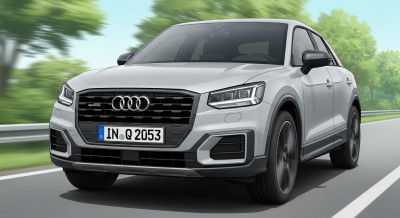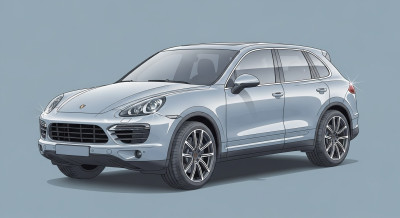NEW McLaren GT: Road Review | Carfection
The McLaren GT is unlike the 570S or the 720S or any other McLaren. It's a completely different beast. Drew Stearne took it for a drive in the South of France to see if it's a true Grand Tourer.
Subscribe for more Carfection videos: http://bit.ly/1V1yFYX
Don't forget to hit the 🔔
Like on Facebook: http://on.fb.me/1RvTdL4
Follow on Twitter: http://bit.ly/1JUAgiI
Instagram: https://www.instagram.com/carfectionfilms/
Discounting the 570GT as a supercar with some token concession to practicality and disregarding the Mercedes-Benz SLR McLaren as a fever dream of a bygone era, the aptly named McLaren GT is the British manufacturer’s first car that it is recognising as a real Grand Tourer.
Where McLaren had initially set its sights on challenging manufacturers such as Ferrari and Lamborghini, the GT takes aim at fellow Brits, Aston Martin and Bentley. Both make cars that adhere to the list of requirements of a Grand Tourer. Powerful, fast, but comfortable, luxurious and a certain degree of practicality and ease of use. The DB11 AMR and Continental GT tick all of those boxes and certainly are the kind of thing that would have come to mind to me if I was to imagine what new GT should be. Front-engined, rear wheel drive, 2+2 layout with a practical trunk space at the rear.
McLaren disagrees. The GT sticks to their tried and tested formula of a carbon tub two seater with a mid-mounted engine. Just like every single other McLaren. It has a twin-turbo, 4-litre V8 good for 611bhp, 465 pounds-feet of torque and a 0-62mph time of 3.2 seconds. That all sounds very familiar.
On paper the stats put it right in amongst the current stable of McLaren supercars. And while the styling of the GT is more understated than the 570S or 720S, lacking some of the bolder design features that those cars have in favour of clean lines and an elegant silhouette, it’s still very much recognisable as a McLaren.
The question begs then, what does it do differently? After less than a mile on the road with the McLaren GT you realise that the answer to that is, a lot.
The engine may have started as a supercar powertrain but it has been substantially modified to suit a different kind of driving. New pistons, manifold and smaller turbos smooth out the power delivery. Torque is now available sooner and for longer, giving the driver less surprises as the needles turn to the right.
The sound that engine makes actually benefits from the Grand Tourer packaging of the McLaren GT. The longer body has lengthened the exhaust which in turn gives out a lower, richer note. For a twin turbocharged engine it sounds closer to an old fashioned V8
It’s not just the engine though that has been meddled with. The brakes and steering are dialled in to be stable and comfortable at speed rather than sharp and responsive. There’s a hefty weight to the wheel and the pedals that can catch you at surprise if you’ve hopped in expecting the GT to drive like the 570S. You might need to put a little bit more pressure on the middle pedal to scrub off any real speed in the GT but the advantage is that you can be ultra precise.
Rather than being able to stop the car dead in its tracks with just a slight push of the brakes the GT makes even the most haphazard of driving inputs feel smooth and measured. Similarly the steering requires more effort but with it give the car more poise and stability at speed.
Although the throttle response can be adjusted across the various modes - comfort, sport and track - it feels radically different from similar modes in other McLarens. If you want the car can still perform like a supercar., launching off the line and gathering a lot of speed in very little time. The difference is that you have to very specifically ask for it.
All modern supercars are easier to drive than the numbers on a spec sheet might suggest, making them easy to drive around town without felling like you’re just the slightest miss-press of a pedal away from spinning off the road. But the McLaren GT takes it a step further making it just as easy to drive at speed. What you lack in the ability to hit every apex and maximise your cornering speed has been replaced by the ability to enjoy speed in a more relaxed fashion.
It’s not a challenging drive that’s going to ask you to push your driving ability to the limit, rather the McLaren GT is forgiving and predictable no matter how fast you go.
McLaren says the suspension is equipped with proactive dampers which not only ready the road as it is but use the driver inputs to predict how to set up the car a few milliseconds early. The result is a car that you can truly mistreat, hard acceleration and then hard braking combined with wild turns you’re not punished with any kind of roll or pitch in the car. Drive over a bump however and the car soaks it up impressively. Without felling too firm, even in the more sports orientated settings, the car can handle more enthusiastic driving
The McLaren GT is unlike the 570S or the 720S or any other McLaren. It's a completely different beast. Drew Stearne took it for a drive in the South of France to see if it's a true Grand Tourer.
Subscribe for more Carfection videos: http://bit.ly/1V1yFYX
Don't forget to hit the 🔔
Like on Facebook: http://on.fb.me/1RvTdL4
Follow on Twitter: http://bit.ly/1JUAgiI
Instagram: https://www.instagram.com/carfectionfilms/
Discounting the 570GT as a supercar with some token concession to practicality and disregarding the Mercedes-Benz SLR McLaren as a fever dream of a bygone era, the aptly named McLaren GT is the British manufacturer’s first car that it is recognising as a real Grand Tourer.
Where McLaren had initially set its sights on challenging manufacturers such as Ferrari and Lamborghini, the GT takes aim at fellow Brits, Aston Martin and Bentley. Both make cars that adhere to the list of requirements of a Grand Tourer. Powerful, fast, but comfortable, luxurious and a certain degree of practicality and ease of use. The DB11 AMR and Continental GT tick all of those boxes and certainly are the kind of thing that would have come to mind to me if I was to imagine what new GT should be. Front-engined, rear wheel drive, 2+2 layout with a practical trunk space at the rear.
McLaren disagrees. The GT sticks to their tried and tested formula of a carbon tub two seater with a mid-mounted engine. Just like every single other McLaren. It has a twin-turbo, 4-litre V8 good for 611bhp, 465 pounds-feet of torque and a 0-62mph time of 3.2 seconds. That all sounds very familiar.
On paper the stats put it right in amongst the current stable of McLaren supercars. And while the styling of the GT is more understated than the 570S or 720S, lacking some of the bolder design features that those cars have in favour of clean lines and an elegant silhouette, it’s still very much recognisable as a McLaren.
The question begs then, what does it do differently? After less than a mile on the road with the McLaren GT you realise that the answer to that is, a lot.
The engine may have started as a supercar powertrain but it has been substantially modified to suit a different kind of driving. New pistons, manifold and smaller turbos smooth out the power delivery. Torque is now available sooner and for longer, giving the driver less surprises as the needles turn to the right.
The sound that engine makes actually benefits from the Grand Tourer packaging of the McLaren GT. The longer body has lengthened the exhaust which in turn gives out a lower, richer note. For a twin turbocharged engine it sounds closer to an old fashioned V8
It’s not just the engine though that has been meddled with. The brakes and steering are dialled in to be stable and comfortable at speed rather than sharp and responsive. There’s a hefty weight to the wheel and the pedals that can catch you at surprise if you’ve hopped in expecting the GT to drive like the 570S. You might need to put a little bit more pressure on the middle pedal to scrub off any real speed in the GT but the advantage is that you can be ultra precise.
Rather than being able to stop the car dead in its tracks with just a slight push of the brakes the GT makes even the most haphazard of driving inputs feel smooth and measured. Similarly the steering requires more effort but with it give the car more poise and stability at speed.
Although the throttle response can be adjusted across the various modes - comfort, sport and track - it feels radically different from similar modes in other McLarens. If you want the car can still perform like a supercar., launching off the line and gathering a lot of speed in very little time. The difference is that you have to very specifically ask for it.
All modern supercars are easier to drive than the numbers on a spec sheet might suggest, making them easy to drive around town without felling like you’re just the slightest miss-press of a pedal away from spinning off the road. But the McLaren GT takes it a step further making it just as easy to drive at speed. What you lack in the ability to hit every apex and maximise your cornering speed has been replaced by the ability to enjoy speed in a more relaxed fashion.
It’s not a challenging drive that’s going to ask you to push your driving ability to the limit, rather the McLaren GT is forgiving and predictable no matter how fast you go.
McLaren says the suspension is equipped with proactive dampers which not only ready the road as it is but use the driver inputs to predict how to set up the car a few milliseconds early. The result is a car that you can truly mistreat, hard acceleration and then hard braking combined with wild turns you’re not punished with any kind of roll or pitch in the car. Drive over a bump however and the car soaks it up impressively. Without felling too firm, even in the more sports orientated settings, the car can handle more enthusiastic driving.
 LEXUS
LEXUS  AUDI
AUDI  PORSCHE
PORSCHE  ROLLS-ROYCE
ROLLS-ROYCE  LAND ROVER
LAND ROVER  FERRARI
FERRARI  MASERATI
MASERATI  CADILLAC
CADILLAC  CHRYSLER JEEP
CHRYSLER JEEP 




































